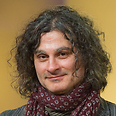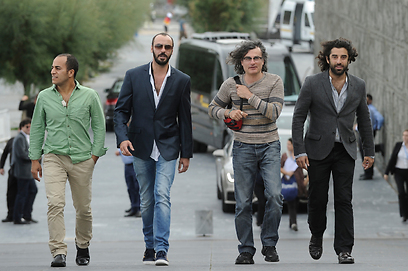
Beirut bans Lebanese film shot in Israel
Lebanon's interior minister says ministry granted director Ziad Doueiri permit to film movie, but was forced to revoke it after receiving letter of protest from Israel Boycott Office of Arab League
"I regret to inform you that the Interior Minister of Lebanon, Minister (Marwan) Charbel, has decided to punish us and the film by banning it... claiming that the reason for the rejection is that I, Ziad Doueiri, had spent time in Israel filming," the director said in a statement on his Facebook page Saturday.
"To set things straight, I did shoot part of the film in Tel Aviv because this is where part of the story takes place. I used Israeli actors because also these were the artistic choices that I have made. And I have no regret and no apologies whatsoever."
Charbel told AFP the interior ministry had granted Doueiri a permit to film the movie but revoked it after receiving a letter of protest from the Israel Boycott Office of the Cairo-based Arab League.
"We had no problem with the movie but when we received the protest letter... we could not oppose" the request, he said.
'The Attack' trailer
The film, which at the weekend received three awards at the COLCOA French film festival in Hollywood – the audience award, the "Coming Soon" award and a special jury prize – is due for release in May in France and in June in the United States.
It was adapted from a novel by Algerian writer Yasmina Khadra and portrays the Israeli-Palestinian conflict through the eyes of an Israeli doctor who discovers that his wife carried out a suicide bombing in Tel Aviv.
'Do we have to carry Palestinian flag?'
Doueiri dismissed the ban as "foolish and unfair", and noted that several Palestinian films shot in Israel with Israeli actors "and even with Israeli financing.. were allowed to screen in Lebanon."
"Why them and not this film? Are the Lebanese supposed to carry the Palestinian flag higher than the Palestinians themselves?" Doueiri asked.
He added that banning the film portrays Lebanon "in a negative light and tells us, filmmakers, that if we think outside the box, we'll be considered pariahs and outlaws."

Doueiri with film's actors (Photo: Getty Images)
The interior minister also sounded confused by the Israeli boycott office's decision, saying: "Although they had told me the film is pro-Palestinian."
Doueiri, who also won awards for his film "West Beirut", also criticized the interior ministry for having refused to allow his latest production to be included in a list of Lebanese films submitted to the Oscars.
Censorship is enforced in Lebanon by the interior ministry if an artist's work is considered to incite confessional dissent, attacks morals or the authority of the state or reflects Israeli propaganda.
Filmmakers in Lebanon must also submit their scripts to the authorities for approval.
Lebanese director Ziad Doueiri poses with the Golden Star award he received for the film "The Attack" on December 8, 2012 during the 12th Marrakesh International Film Festival in Marrakesh. Doueiri said Saturday the Lebanese authorities have banned his film "The Attack" from cinemas in his home country because it was partly shot in Tel Aviv using Israeli actors.
(L-R) French actor Karim Saleh, Lebanese film director Ziad Doueiri, Palestinian actors Ali Suliman and Ramzi Maqdisi pose during a photocall after the screening of Doueiri's film "The Attack" during the 60th San Sebastian International Film Festival on September 25, 2012, in northern Spain.










